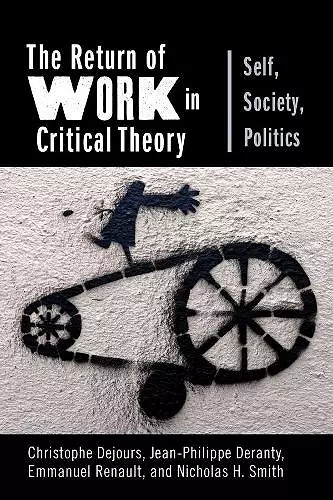The Return of Work in Critical Theory
Self, Society, Politics
Emmanuel Renault author Jean-Philippe Deranty author Nicholas H Smith author Christophe Dejours author
Format:Hardback
Publisher:Columbia University Press
Published:3rd Jul '18
Should be back in stock very soon

From John Maynard Keynes’s prediction of a fifteen-hour workweek to present-day speculation about automation, we have not stopped forecasting the end of work. Critical theory and political philosophy have turned their attention away from the workplace to focus on other realms of domination and emancipation. But far from coming to an end, work continues to occupy a central place in our lives. This is not only because of the amount of time people spend on the job. Many of our deepest hopes and fears are bound up in our labor—what jobs we perform, how we relate to others, how we might flourish.
The Return of Work in Critical Theory presents a bold new account of the human significance of work and the human costs of contemporary forms of work organization. A collaboration among experts in philosophy, social theory, and clinical psychology, it brings together empirical research with incisive analysis of the political stakes of contemporary work. The Return of Work in Critical Theory begins by looking in detail at the ways in which work today fails to meet our expectations. It then sketches a phenomenological description of work and examines the normative premises that underlie the experience of work. Finally, it puts forward a novel conception of work that can renew critical theory’s engagement with work and point toward possibilities for transformation. Inspired by Max Horkheimer’s vision of critical theory as empirically informed reflection on the sources of social suffering with emancipatory intent, The Return of Work in Critical Theory is a lucid diagnosis of the malaise and pathologies of contemporary work that proposes powerful remedies.
This groundbreaking book restores something often missing in critical social theories of labor: the embodied and affective dimensions of the lived experience of working. In articulating this interdisciplinary perspective, the authors show that addressing the forms of injustice and harm to which workers are subjected demands more than improved labor market choices; it requires that we ensure the social and physical conditions for genuinely meaningful work experiences. Urgently needed and highly recommended. -- Joel Anderson, Utrecht University
This is a unique book jointly written by an interdisciplinary group of four international scholars. Making the most of decades of research that speak for the long-forgotten centrality of work in the everyday production of subjectivity, it is a crucial contribution to the critical theory of the twenty-first century. If you wonder why capitalism has not managed to make people 'happy' in the workplace, or why the most successful managers today argue that firms need to put 'people first,' this book leads you to the root cause. People at work have high expectations with regard to their own conceptions of justice and autonomy, and the current model of capitalist management cannot do with their critique of work. At a turning point in history, this book presses us to see that without addressing the critique of work formulated by workers themselves, firms will lack the cooperation they so desperately seek, and democracy as we know it, segregated from the economy, simply cannot be a viable project. -- Isabelle Ferreras, author of Firms as Political Entities: Saving Democracy Through Economic Bicameralism
With succinct clarity, this book makes a fresh and original case for a critical inquiry into the nature of work—what it means, why it matters, and the impact it has upon our lives. Drawing on the psychodynamics of work and recognition theory, the authors provide a robust account of the experience of working which is both compelling and persuasive. Of particular value is the translation of theory into practice via a striking case study examining work organization and mental health. -- Ruth Yeoman, author of Meaningful Work and Workplace Democracy: A Philosophy of Work and a Politics of Meaningfulness
The Return of Workin Critical Theory shows that work has a significant impact in people’s lives, for it provides not merely a paycheck but also a number of psychological and moral goods. Good work contributes substantially to positive mental health, and stressful work can contribute substantially to psychological suffering. In addition to highlighting legitimate worries about unemployment, underemployment, and precarious work, the authors examine normative expectations concerning justice and autonomy in work and sketch possibilities for transforming working life into a healthier, more cooperative, and more democratic enterprise. -- Andrea Veltman, author of Meaningful Work
There is little engagement in contemporary critical theory with the issue of work in general, and with the project of a normative theory in which work is central, in particular. The discussion in The Return of Work in Critical Theory is urgently needed for critical theory to become capable to react to the normative struggles around work which many diagnose in contemporary societies. -- Titus Stahl, University of Groningen
ISBN: 9780231187282
Dimensions: unknown
Weight: unknown
248 pages